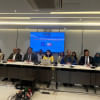A strategic roadmap to battling inflation

The newly formed interim government in Bangladesh faces two significant challenges: an extraordinary political challenge compounded by severe economic difficulties not seen in decades. A major factor driving these economic troubles is soaring inflation, largely a result of unprecedented economic mismanagement by the previous administration. While official inflation rates hovered around 8 percent during the tenure of former Prime Minister Sheikh Hasina, concerns about the accuracy of these figures were widespread. These suspicions now appear validated after recent estimates by the Bangladesh Bureau of Statistics (BBS), which show inflation surging to 11.66 percent year-over-year in July, followed by 10.49 percent year-over-year in August.
In an article published in The Daily Star on August 21, 2022, I urged the Bangladesh Bank to adopt a contractionary monetary policy to combat inflation. At the time, the central bank's governor hesitated to raise interest rates. Between September 29, 2022, and May 9, 2024, the central bank eventually increased the policy rate by 3.5 percentage points. However, this measure has proven insufficient, as demonstrated by Bangladesh Bank's recent decision to further raise the policy rate by 50 basis points, bringing it to 9 percent, effective August 27, 2024. The new governor has expressed his commitment to continuing rate hikes until inflation subsides.
While the recent rate hike aligns with economic theory, its limitations should not be ignored. First, raising the policy rate primarily targets demand-pull inflation and is less effective against cost-push inflation. Second, it could worsen the liquidity crisis already plaguing banks that have suffered years of mismanagement—a concern some bankers have already voiced. The last thing Bangladesh needs is a bank run, a risk that cannot be ruled out if liquidity issues intensify due to further rate hikes. Given these risks, and the country's economic fragility, controlling inflation requires a multi-faceted strategy rather than relying solely on monetary tightening. In this article, I would like to present a strategic roadmap that, if adopted, can lead to a reduced and stable inflation regime in Bangladesh in the long run.
The first step to managing inflation is to ensure the collection of accurate, reliable data to facilitate timely, informed decision-making. To this end, the interim government should consider restructuring the BBS, which is responsible for collecting key economic data. This restructuring should include a review of the current methodology, particularly the base year and "basket of goods" used to measure inflation. Additionally, the government should revitalise the Price Monitoring and Forecasting Cell within the Ministry of Commerce. Although established in 2014, this cell has had limited impact on stabilising essential commodity prices. Engaging external experts, including distinguished economists and statisticians from Bangladesh, may strengthen these efforts.
While reliable data collection is crucial for identifying the main drivers of inflation, it will take time before yielding actionable insights. Meanwhile, economic theory must guide the government's approach to controlling inflation. The government cannot rely solely on the central bank's monetary policy; it must explore other avenues to achieve stable and reduced inflation.
One such approach is cracking down on monopolistic and oligopolistic practices, as some firms have been accused of illegal price gouging. Strengthening the Bangladesh Competition Commission to more effectively combat anti-competitive behaviour is essential. If necessary, the commission should be restructured to include experts in antitrust law, consumer protection, and competition economics. The US Federal Trade Commission, led by Columbia Law School professor Lina Khan, offers a strong example, having sued the e-commerce giant Amazon in 2023 for maintaining monopoly power.
Another often-overlooked tool for combating inflation is improving productivity. Increased productivity lowers production costs, making it cheaper to produce the same output. One of the main barriers to higher productivity in Bangladesh is a lack of skilled labour, which could be addressed through enhanced technical and vocational education. In addition to the existing 2-year and 4-year programmes, the government should introduce shorter hard skill-enhancing programmes focusing on electrical work, data entry, machine operation, quality assurance, etc. Local NGOs with established networks can play a vital role in promoting these programmes and removing barriers to education.
The decline in productivity also likely correlates with the drying up of foreign direct investment (FDI) in Bangladesh. According to UNCTAD, FDI declined by about 14 percent from 2022 to 2023. This loss of investment is particularly significant, given that the cost of capital is much lower in advanced economies than in Bangladesh. The country's poor ranking in the World Bank's Ease of Doing Business report, where it ranked 168 out of 190 countries in 2020, underscores the need for improvement in the overall business environment. Infrastructure deficiencies, bureaucratic red tape, and corruption are widely cited obstacles to attracting FDI.
Corruption remains a persistent challenge. A notable example is the World Bank's 2012 withdrawal from funding the Padma Bridge project due to allegations of procurement-related corruption. To attract foreign investment, the government must take decisive action. One potential step is mandating annual asset disclosures from government employees and their immediate families. Although employees are currently required to declare assets upon joining the service and submit wealth statements every five years, enforcement has been lax.
Encouragingly, on September 1, 2024, the interim government issued a directive mandating that all employees comply with existing rules, warning of penalties for non-compliance. However, the specifics of these penalties remain unclear, making it difficult to assess the directive's potential impact. Importantly, collecting asset data is just the first step. The government must develop a robust system to analyse this information and identify anomalies. Modern technological tools, including AI and large language models, could play a crucial role in automating this process, enhancing the government's ability to detect corruption efficiently.
Similarly, migrant workers may need incentives to send remittances through formal banking channels rather than informal methods. Boosting remittance inflows could help ease pressure on import prices, with positive effects on inflation. The Bangladesh government could explore offering "priority cards" to migrant workers who send a certain amount of remittance annually through formal channels. These cards could grant access to fast-track immigration lanes at airports and discounted services at Bangladesh embassies abroad. Obviously, this is just one idea and the government along with the Bangladesh Bank may need to try other initiatives on a trial basis.
Additionally, the government must also avoid crowding out private sector investments by monopolising funding for development projects. The previous administration's reckless practice of pressuring Bangladesh Bank to print money for infrastructure spending must not be repeated. In this context, overhauling the government's tax collection strategies cannot be overstated. From the perspective of Modern Monetary Theory, tax reforms can play a role in inflation control while providing the much-needed funds for development projects. Therefore, the government should prioritise strengthening the National Board of Revenue by equipping it with the workforce, tools, and—most importantly—independence from political interference.
Finally, it is essential to recognise that significantly reducing inflation will take time. Treating it as a "quick fix" would be a mistake. Given that the interim government may have a limited mandate, it should focus on laying the groundwork for long-term measures that the future government can continue to implement in order to bring inflation down to manageable levels.
Dr Tasneem Raihan is a Bangladeshi-American financial economist.
Views expressed in this article are the author's own.
Follow The Daily Star Opinion on Facebook for the latest opinions, commentaries and analyses by experts and professionals. To contribute your article or letter to The Daily Star Opinion, see our guidelines for submission.

 For all latest news, follow The Daily Star's Google News channel.
For all latest news, follow The Daily Star's Google News channel. 








Comments